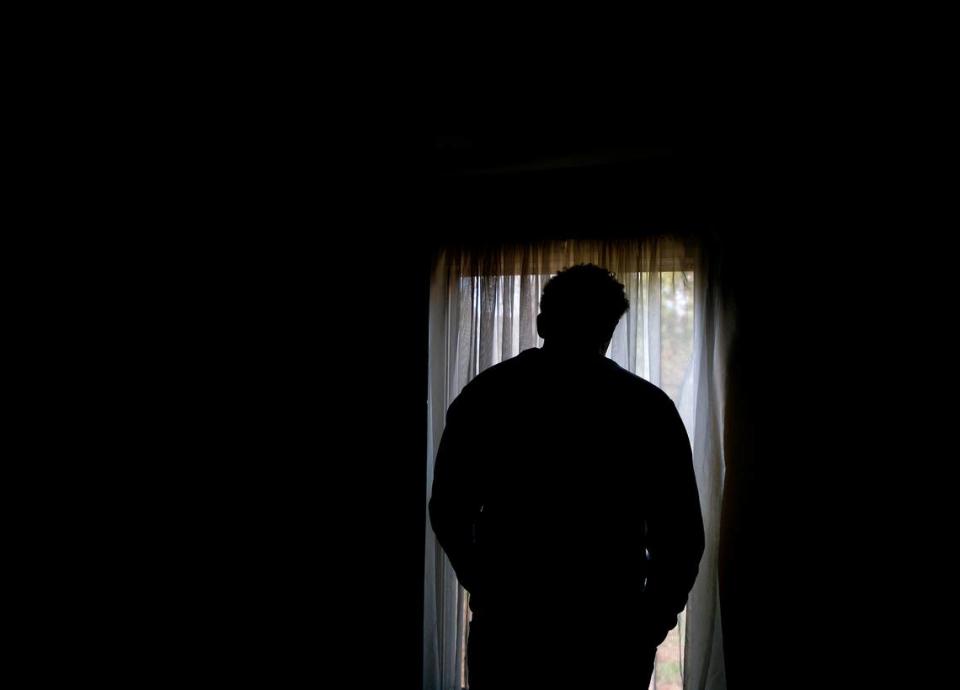Lawsuit demands that NC stop locking minors in rooms in detention amid staffing crisis
A federal lawsuit filed Monday seeks to bar North Carolina from holding youth in juvenile detention across the state in what amounts to solitary confinement.
The lawsuit, which seeks class-action status, was filed on behalf of three youth ages 15-, 16- and 17-years old who have been in solitary confinement-like conditions since November and December, the lawsuit states.
“The children locked in juvenile detention centers across North Carolina are not receiving ‘quality services,’ are not in a ‘humane environment,’ and are not receiving ‘basic educational services’,“ the lawsuit contends.
The suit asks a judge to temporarily and permanently bar the state from keeping youth in juvenile detention in their room for more than 23 hours a day, as has been occurring. That violates their U.S. constitutional rights that guarantee due process and protect them from cruel and unusual punishment, the lawsuit states.
The lawsuit was filed by Charlotte-based attorneys Robert Lindholm, who is in private practice, and Michelle Duprey, an attorney for Council for Children’s Rights in Charlotte. That nonprofit agency represents youth from Mecklenburg County in criminal juvenile court.
Lindholm says they plan to fill a motion for a preliminary injunction, which would seek an immediate halt to isolating youth, soon.
“Holding children who have not even had their cases adjudicated by a court yet in solitary confinement for… 23 to 24 hours a day in a cell is unconstitutional,” he said. “Plain and simple.”
In previous interviews, Williams Lassiter, deputy secretary of North Carolina’s Division of Juvenile Justice and Delinquency Prevention, has said the state turned to isolating youth in their rooms after a severe staffing shortage and other challenges created safety concerns for youth and staff.
Lassiter said he doesn’t consider the practice solitary confinement since it isn’t being used as a punishment and youth aren’t being held in an isolated unit. North Carolina banned the use of solitary confinement for youth years ago, he said.
State juvenile justice officials declined Monday to comment on the pending lawsuit, which was filed in the federal Middle District of North Carolina against the North Carolina Department of Public Safety and other state officials.

Two facilities named
The lawsuit mentions conditions at Cabarrus Regional Juvenile Detention Center and C.A. Dillion Regional Juvenile Detention Center, but contends the isolating practice is happening across the state.
At the 62-bed Carbarrus facility, children are locked in their small rooms, which the lawsuit calls cells, for 23 or more hours a day, the lawsuit states.
If the youth take more than 10 minutes to shower, they have to shower in their sink the next day, the lawsuit states.
They are allowed out of their cells for a shower and 30 minutes of recreation twice a week, the lawsuit states. Some are allowed out to make phone calls to their families, it states, others are allowed out to fill their water bottles or to clean.
The solitary confinement is exacerbated for some who don’t have mattresses, the lawsuit states.
“As a result, children sometimes are forced to sleep for multiple nights on a piece of plastic that serves as a bed frame in the cells,” the lawsuit states.
State law requires that the Department of Public Safety administer an education and other services according to the juvenile’s needs, the lawsuit states. But that isn’t happening when youth are confined in their rooms and don’t receive instruction for weeks, the lawsuit states.
“Defendants’ actions prevent children from attending school at the detention centers and from regularly receiving tutoring or other individualized instruction or classroom services.” the lawsuit states.
At Cabarrus, only a handful of children have received educational services, the lawsuit states. At Dillon, education mainly consists of work searches and crossword puzzles being slipped under the door, the lawsuit states.
Most of the youth don’t even have access to meaningful human interaction, the lawsuit states.
“Sometimes they can talk to other children through the walls, but risk punishment for doing so,” the lawsuit states.
A 15-year-old who has been detained at Cabarrus since November typically spends 23 hours and 50 minutes in what the lawsuit calls a cell. He sometimes asks the guards if he can clean or mop just to get out of his room, the lawsuit states.
When youth are caught talking to other youth, the response often results in the youth being confined in his room for three days in which their doors and window are covered, the lawsuit states.
Sometimes the 15-year-old gets so frustrated he just screams, the lawsuit states.
“It is difficult to be in his cell the entire day because the other children are often screaming and yelling and banging on their cells
Mecklenburg County closed its juvenile detention center in December 2022, sending those youth to facilities across the state but the majority going to Cabarrus.

‘Maggots in the toilets’
At the 35-bed Dillon facility, children have reported black maggots in the toilets in their cells, the lawsuit states. On most days the youth are let out of their rooms for 10 minutes to shower.
On Dec. 19, phone calls were reduced to once a week, the lawsuit states. The youth have no recreational time and don’t go outside unless they are going to court.
As early as January. 2023, the Council for Children’s Rights has raised concerns about conditions at the Cabarrus facility to the juvenile justice division, but nothing was done, the lawsuit states.
Those concerns included the lack of education, therapeutic services, youths’ limited time outside their cells, rigid access to showers and the amount of time flaps are left covering doors on their rooms, preventing youth from viewing a common area.
Concerns about the solitary confinement conditions were also raised at numerous meetings among members of the Charlotte community and Lassiter, head of the juvenile justice division.
“Despite the alarming allegations, Defendants have failed to address the problem,” the lawsuit states.
Youth confined hundreds of times
In December, The News & Observer exclusively revealed that North Carolina’s Division of Juvenile Justice and Delinquency Prevention was locking some minors ordered to juvenile detention in their rooms for most of the day due to a severe staffing shortage and other challenges.
Since 2021, juvenile justice staff have confined kids for such “administrative” reasons 2,097 times, the state says.
Such confinements peaked in 2021 for reasons related to the COVID-19 pandemic, say state officials, who expect the practice to continue to decline.
But during 2023, the state still isolated kids due to staffing and overcrowding 274 times, with single lock ups lasting 60 hours on average.
Youth in North Carolina juvenile detention facilities are also confined as a behavior modification tool or to prevent them from harming themselves or others.
Since 2021, officials have used that type of confinement 2,442 times, with periods averaging 11 hours this year, according to data provided by the division.
Juvenile justice experts said they don’t distinguish between the two confinements. Being in isolation for administrative reasons increases the chances of the youth acting out and being isolated for behavioral reasons, they said.
Most of the youth are waiting for their juvenile courts cases to be resolved and haven’t been convicted of criminal behavior. Others are awaiting placements in mental health or other facilities.
NC isolated hundreds of youth in detention. What we know about how many and why.
Response from state
Lassiter has said he agrees the isolation is problematic as the division aims to have minors engaged most of the day learning, exercising and receiving therapy.
The COVID-19 pandemic created additional strains, as detention became a catch all for youth in crisis, Lassiter has said. There has since been an increase in the numbers of minors the state detained, as well as the average time they were detained, according to data provided by the state.
The increase follows a state law that went into effect in 2019 requiring 16- and 17-year-olds, including those awaiting trial for serious felonies in adult court, to be detained in juvenile facilities instead of county jails for adults.
The average daily juvenile detention population in juvenile detention facilities in 2022 ranged from 285 to 334 with youth entering detention facilities about 2,600 times, according to state data. The number of detained youth was a small percentage of the 21,867 youth served by juvenile justice and its partners that year.
Juvenile Justice and Department of Public Safety leadership have taken multiple steps in recent years to address the challenges, Lassiter said.
In October, North Carolina legislators adopted a budget that included a new pay plan for juvenile justice employees. Employee applications increased, but the hiring process is expected to take months, officials have said.
The juvenile justice division has also hosted dozens of recruiting events, assigned others such as court counselors to detention facilities, and offered incentive bonuses.
In addition, the division has or is opening three new facilities with a total of 108 new beds when fully staffed.
While the new beds will help, the better and more productive solution is more community resources that will help prevent youth from being detained, Lassiter and others said.
Experts warn against isolating minors
Experts who work with or on behalf of youths in the juvenile justice system have said they are concerned that vulnerable youth, many of whom have mental health issues, will pay a price with long term effects on themselves and the communities they will return to.
“It increases nearly every kind of behavior that we all want to stop,” said Corye Dunn, director of public policy for Disability Rights North Carolina.
Multiple agencies, including the American Medical Association, the American Academy of Child and Adolescent Psychiatry and others have called for the end of solitary confinement of juveniles, the lawsuit states.
It could affect their physical and mental health, as well as put them behind in school and with social skills, said experts who work with incarcerated youth, experts say.
The practice has also been linked to self harm too, they say.
Virginia Bridges covers criminal justice in the Triangle and across North Carolina for The News & Observer. Her work is produced with financial support from the nonprofit The Just Trust. The N&O maintains full editorial control of its journalism.

